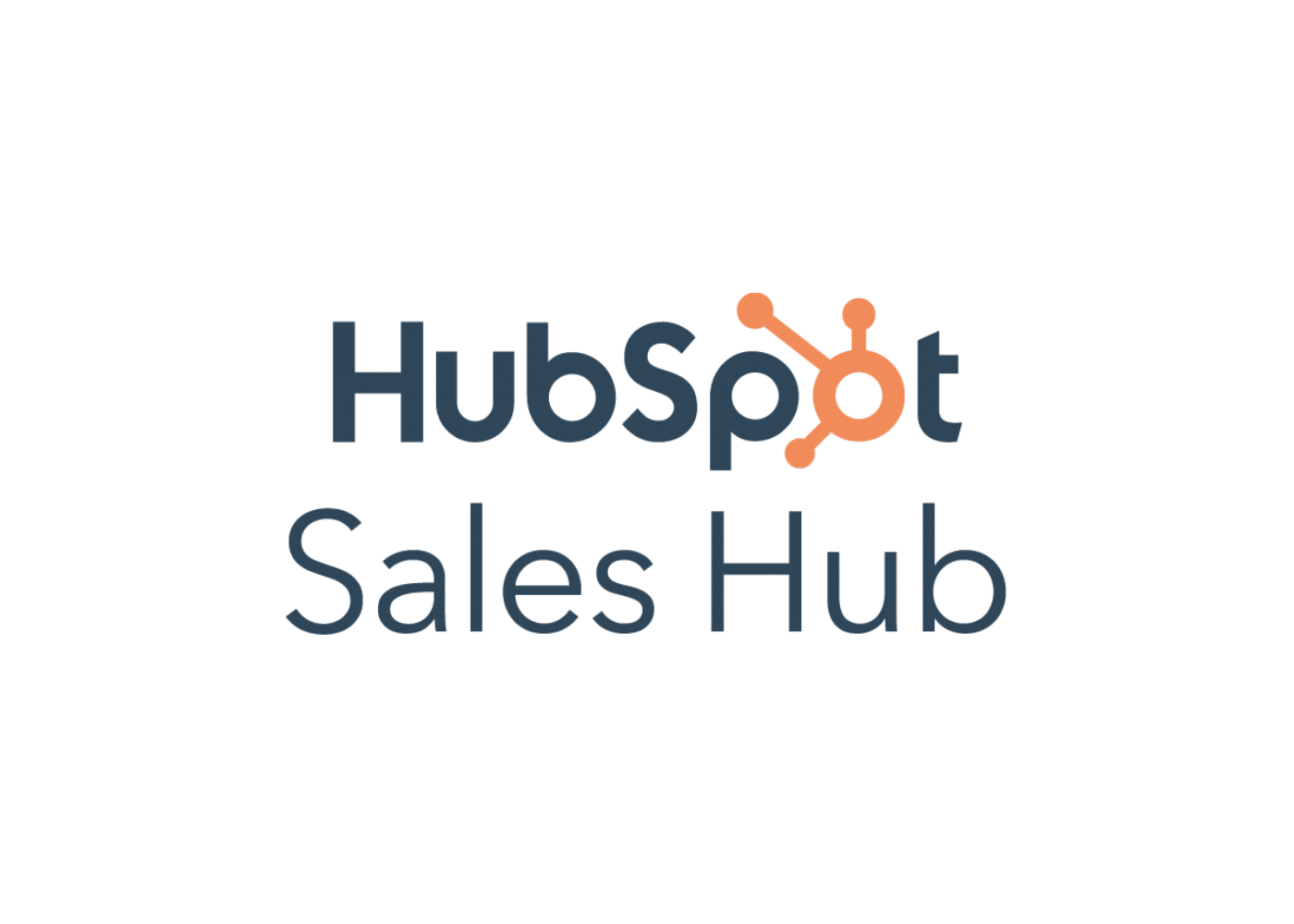HubSpot Sales Hub
Learn More Today!-
Free Tools Available
-
Powerful Deal and Task Tracking
-
Helpful Meeting Scheduling Feature
Sales can be a tricky game, so it’s important to utilize the right tools to give yourself the best chance at success.
Choosing the wrong one can result in a lot of time, money, and energy wasted in the process.
I’m AJ. I created a digital agency within 4 years and successfully sold it for a multi-million dollar exit. Now, I hope to impart my knowledge of digital marketing to aspiring small businesses.
That’s why the Small Business Bonfire team and I conducted this HubSpot Sales Hub review. We took a thorough look at all of its features in order to give you the tools to decide if it’s right for you.
Let’s get into it!
You Can Trust Small Business Bonfire
Since 2009 Small Business Bonfire has been testing and rating thousands of business software to help you (our small business owners) start & scale your organizations. If you want to know more about how we test, please read this article here.
What is HubSpot Sales Hub?
In short, HubSpot Sales is software designed to help sales teams manage and optimize their workflow.
It’s a cloud-based platform that provides an array of features for accomplishing the following:
- Managing leads and contact information
- Tracking sales analytics
- Automating processes
- Measuring success
We use HubSpot regularly at the agency, however, in this case, we set up Small Business Bonfire on their Starter plan at the reasonable price of $20/month.
Pros and Cons of HubSpot Sales Hub?
There are plenty of benefits to using HubSpot Sales Hub; however, it’s also important to examine the negatives as well. Let’s go over the pros and cons.
HubSpot Sales Hub Pros
- Intuitive user interface
- Free tools available
- Comprehensive reports & analytics
- Helpful meeting scheduling tools
HubSpot Sales Hub Cons
- Depending on the plan you choose, it can be expensive.
- Limited customization options
Who Is HubSpot Sales Hub Best Suited For?
HubSpot Sales Hub is for great large enterprises and businesses looking to scale. Their free tools and Starter plans also allow businesses to take advantage of powerful lead tracking tools without breaking the bank.
Larger sales organizations with a bigger budget can benefit from their Sales Hub Enterprise plan, which includes additional reporting and sales automation capabilities.
Who Is HubSpot Sales Hub Not Suited For?
HubSpot’s Sales software can be on the expensive side for smaller businesses that want access to Professional and Enterprise-level features.
So, if you’re a business that’s on the smaller side, or is just starting out, you might want to look at other options that are more cost-effective such as Monday.com.
HubSpot Sales Hub Pricing: How Much Does It Cost?
HubSpot Sales Hub has 3 pricing plans. They also offer lots of helpful free tools with no commitment needed.
They are the following (billed annually):
- Sales Hub Starter: $20/Month
- Sales Hub Professional: $500/Month
- Sales Hub Enterprise: $1,200/Month
We’ve also taken the time to review all HubSpot pricing in one comprehensive guide.
How Does HubSpot Sales Hub Pricing Compare?
HubSpot Sales Hub – $20/Month
- Free plan
- Powerful contact management
- Simple automation
- 2 deal pipelines
- No lead scoring
EngageBay Sales Bay – $12.99/Month
- Free plan
- Powerful contact management
- Workflow automation
- Multiple deal pipelines
- Lead scoring
Freshsales – $18/Month
- Free plan
- Powerful contact management
- Workflow automation
- Single sales pipeline
- Lead scoring
Zendesk Sell – $25/Month
- No free plan
- Basic contact management
- No workflow automation with the basic plan
- 2 sales pipelines
- No lead scoring with the basic plan
When it comes to pricing, EngageBay is clearly the best option at $12.99/month.
However, HubSpot Sales Hub offers some powerful features that are tough to beat. In terms of features, HubSpot is our first pick.
HubSpot Sales Hub Pricing Tips
HubSpot Sales Hub Core Features
HubSpot's Sales Hub provides a comprehensive deal pipeline system that allows you to track, manage, and measure your sales process. This way, you can take on more deals and close them more quickly.
It includes customizable stages to help ensure deals move through the funnel.
This can help especially with task management for your sales reps.
Here's an example of the Sales Pipeline we created using the Deals feature.
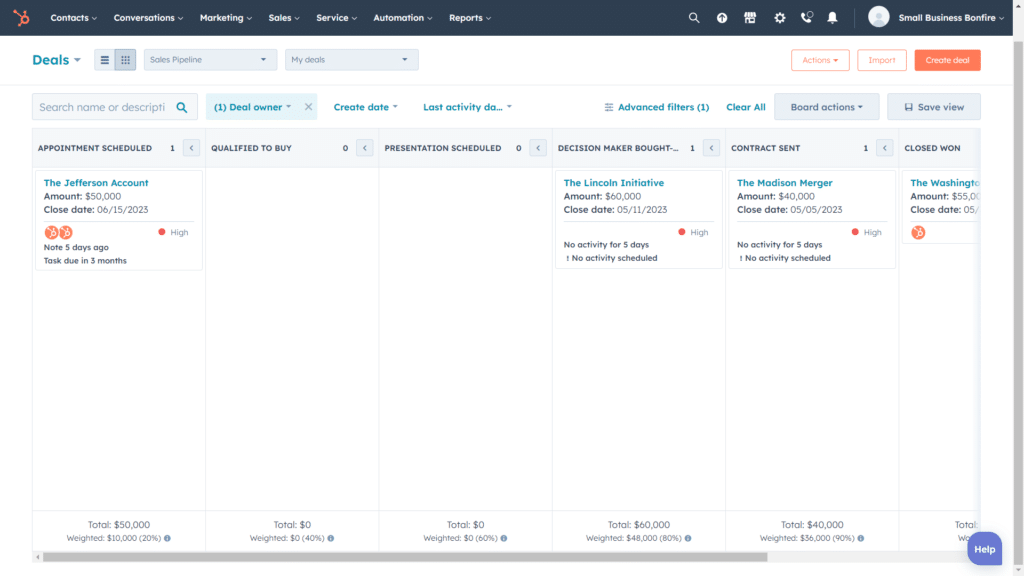
We also especially liked the customization options such as the ability to add the following to each deal:
- Attachments
- Quote details
- Line items
- Contacts
- Companies
The screenshot below shows our team adding a quote to one of our hypothetical deals.
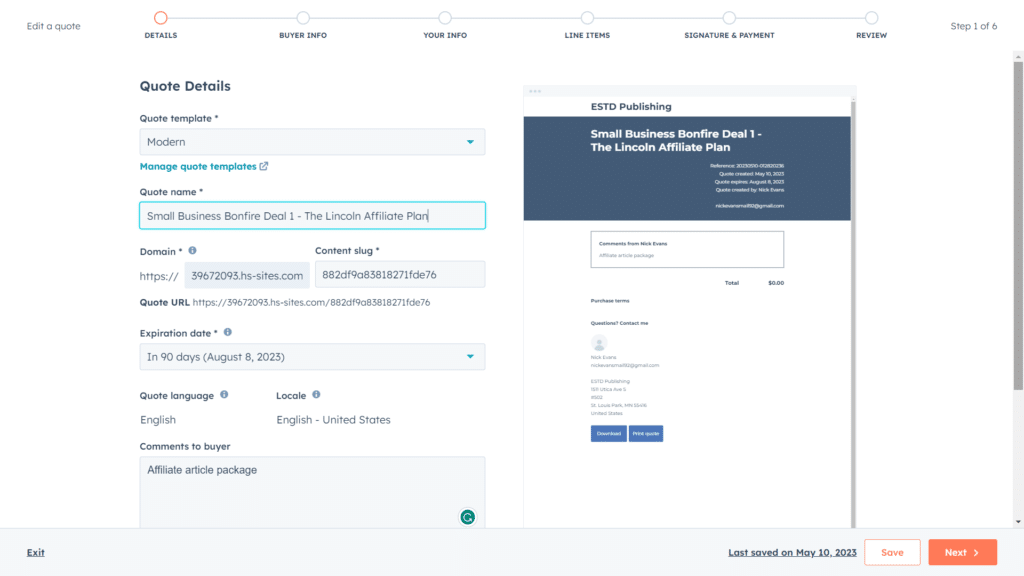
HubSpot's Sales Hub offers the ability to schedule meetings, send calendar invites, and set reminders for you and your team.
You can also connect to Google Calendar, Outlook Calendar, and Office 365 so that you never miss an important event.
We created a 10-minute Monday meeting as an example so you could see how the interface works.
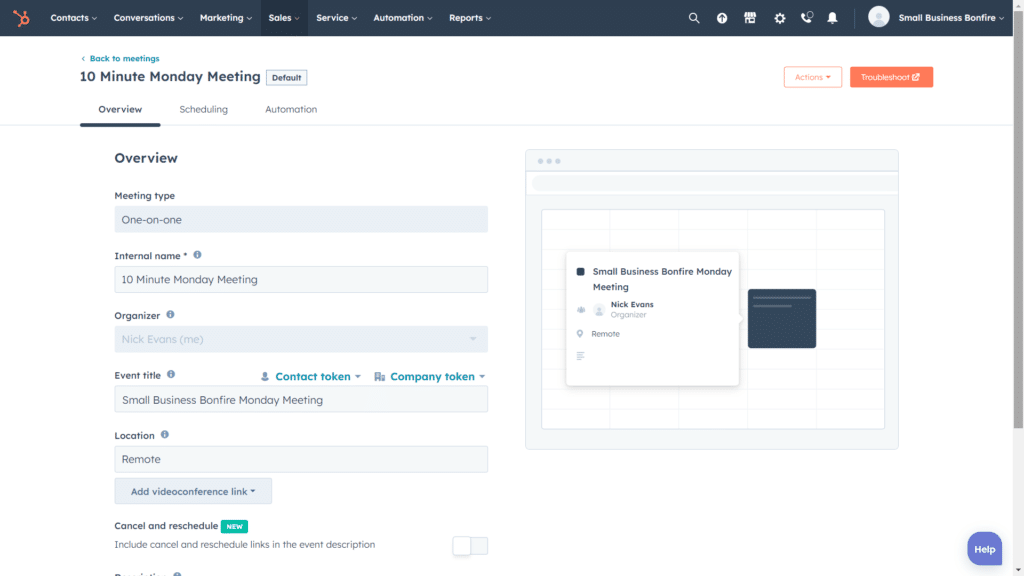
HubSpot Sales Hub allows you to keep all of your contacts in one place.
You can easily create, store and track data on contacts, companies, and deals all in the same platform.
We easily created a contact profile for our example customer below.
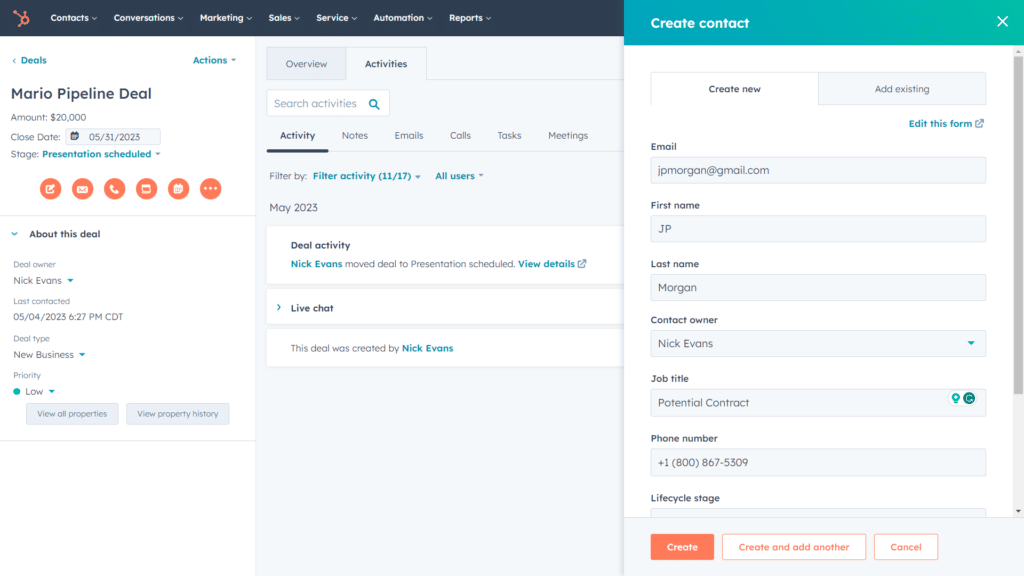
HubSpot's Sales Hub has task tracking that includes the following features:
- Calendar syncing
- Insights including activity and weekly reports
- Ability to assign tasks to team members, set deadlines, and track progress
We set up some tasks to test out how easy it was and found it to be relatively simple.
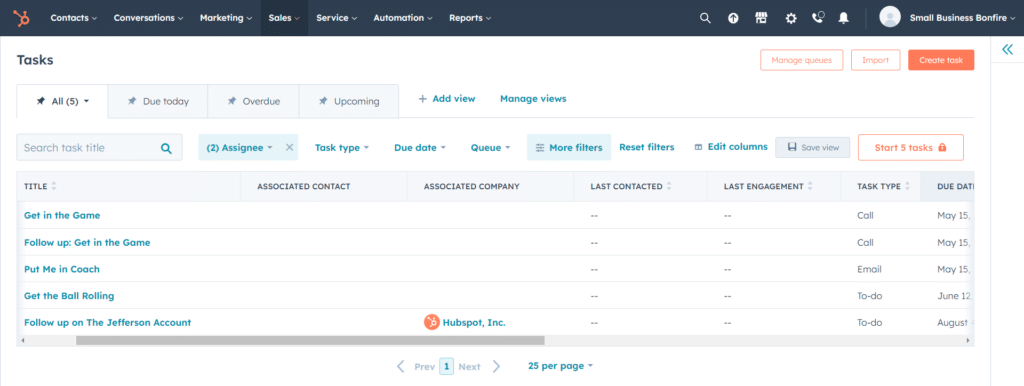
You can add the following information for each task:
- Task categories
- Notes
- Tags
- Custom fields
HubSpot Sales CRM also has an intuitive Dashboard feature that allows users to personalize their dashboard using helpful templates.
Some examples of templates include:
- Chat Overview
- Email Overview
- Marketing Contacts
- Sales
- Sales Manager
- Sales Rep
We went with the Sales template and created a dashboard to view our sample deals.
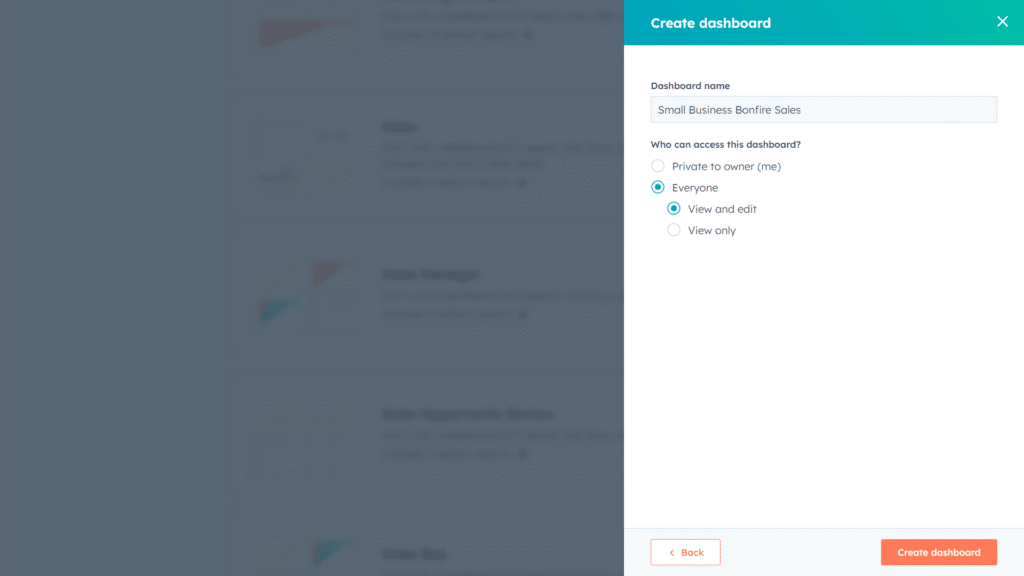
We were then able to see our team activity by date, deals closed, contacts created, and other sales-related analytics.
Here's a screenshot of our dashboard to give you a better idea of how it's laid out.
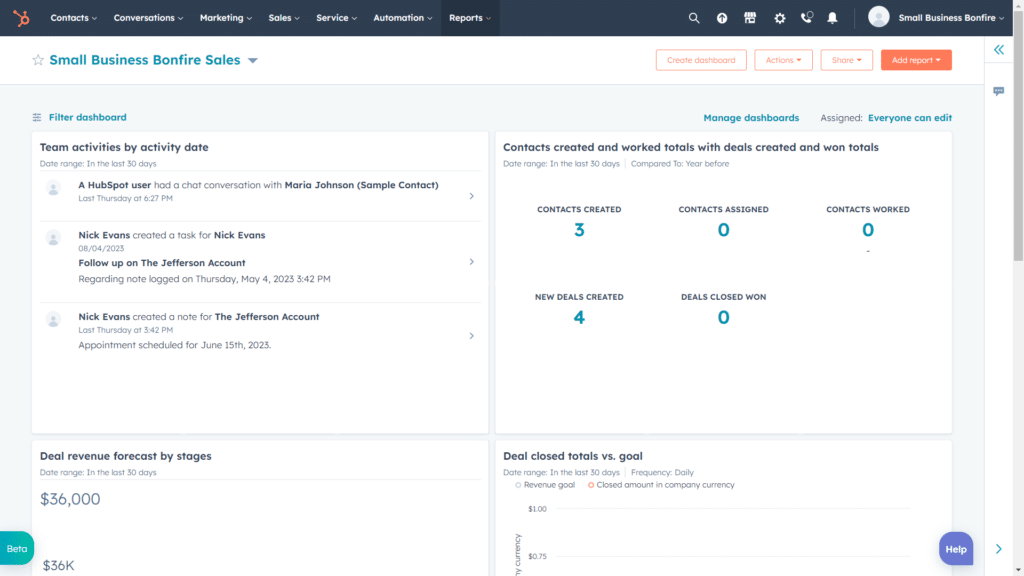
The Small Business Bonfire team and I found this to be especially simple to navigate, and we loved having all of our data in one place with just a few clicks.
If you're looking for a smarter, more streamlined way to connect with leads and customers, HubSpot Sales Hub's Chatflows feature is the answer.
This dynamic chat feature allows your business to engage with leads and visitors to your site while your team focuses on other tasks.
With a few clicks and keyboard strokes, we were able to create a customized chatbot that could do everything from assigning conversations to team members to answering frequently asked questions by searching the knowledge base.
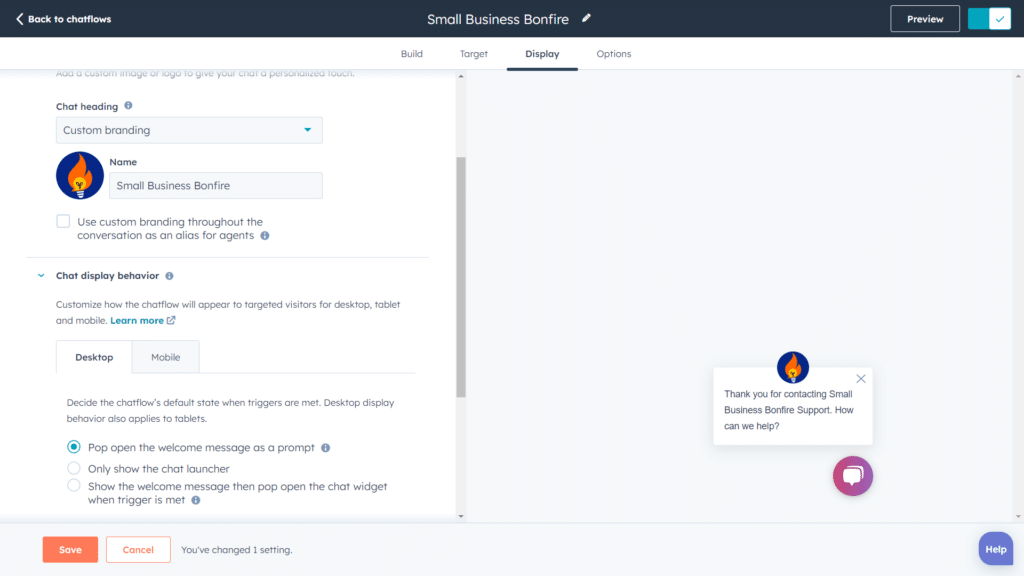
What are the Limitations of HubSpot Sales Hub?
The easy answer here is the price tag. As we mentioned, HubSpot Sales Hub costs quite a bit more than some similar Sales CRM services like Salesforce or Monday.com.
If you’re just looking for a sales-related product, we recommend you check out Salesforce.
However, if you’re already using HubSpot for its other features, Sales Hub can be a powerful tool in your arsenal.
What Sets HubSpot Sales Hub Apart from the Competition?
HubSpot Sales Hub really stands out from the competition in its ability to work seamlessly with HubSpot’s other Hubs.
Utilizing HubSpot’s software keeps all of your analytics in one place, allowing your team to easily track progress in real-time.
If you’re looking for an all-in-one product to help manage sales, we recommend utilizing everything that HubSpot has to offer, including Sales Hub. It’s also incredibly beginner-friendly and easy to use.
Getting Started with HubSpot Sales Hub
The startup process with Sales Hub was quick and easy.
We filled out our job field, title, and organization name and were able to get the ball rolling.
They provided a tutorial that would be very helpful for beginners, as well as some tips on how to get started (shown below).
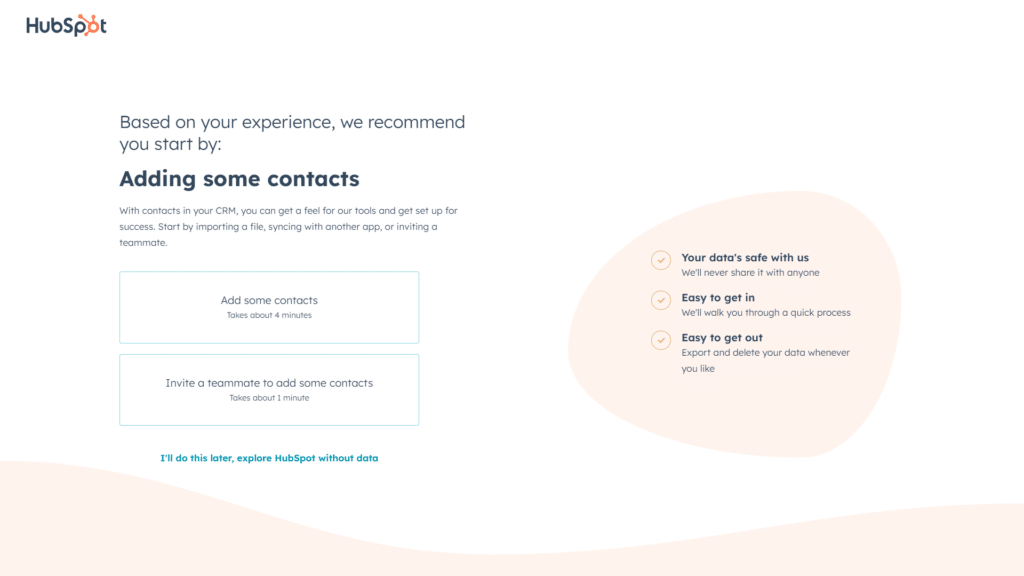
Overall, the onboarding experience was engaging with a very easy learning curve.
How Do You Use HubSpot Sales Hub?
HubSpot Sales Hub is primarily used by businesses involved in sales and marketing, especially those who rely on the following:
- Lead generation
- Pipeline management
- Customer retention
It is ideal for companies that are looking to streamline their sales process, automate repetitive tasks, and gain more insights into their sales performance.
This is especially helpful when combined with HubSpot’s other powerful features like Service Hub and Marketing Hub.
HubSpot Sales Hub Customer Service & Support Review
HubSpot Sales Hub offers 24/7 live chat, email, and phone support.
To test this out, we asked a question about navigating the Deals pipeline.
We had to wait a few minutes to be connected with a representative; however, once we were, they were super helpful.
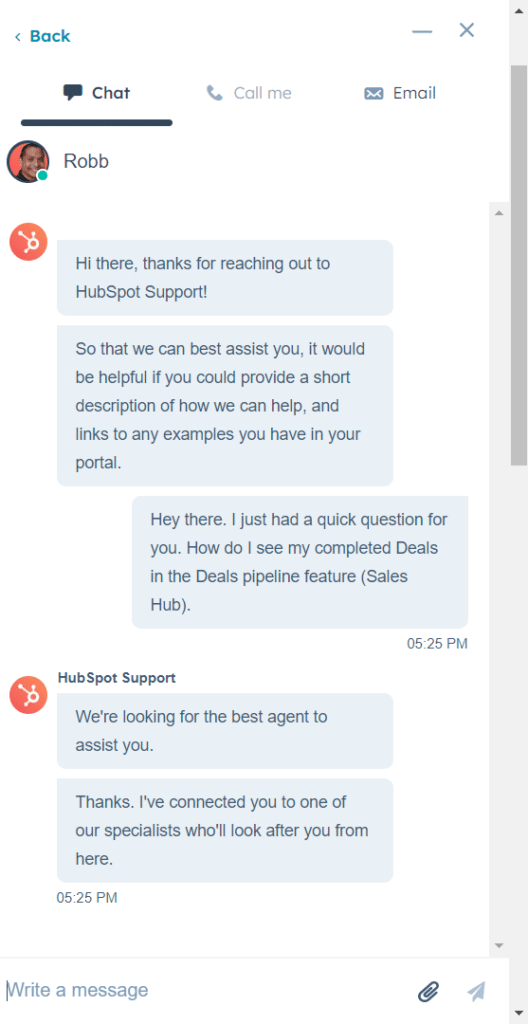
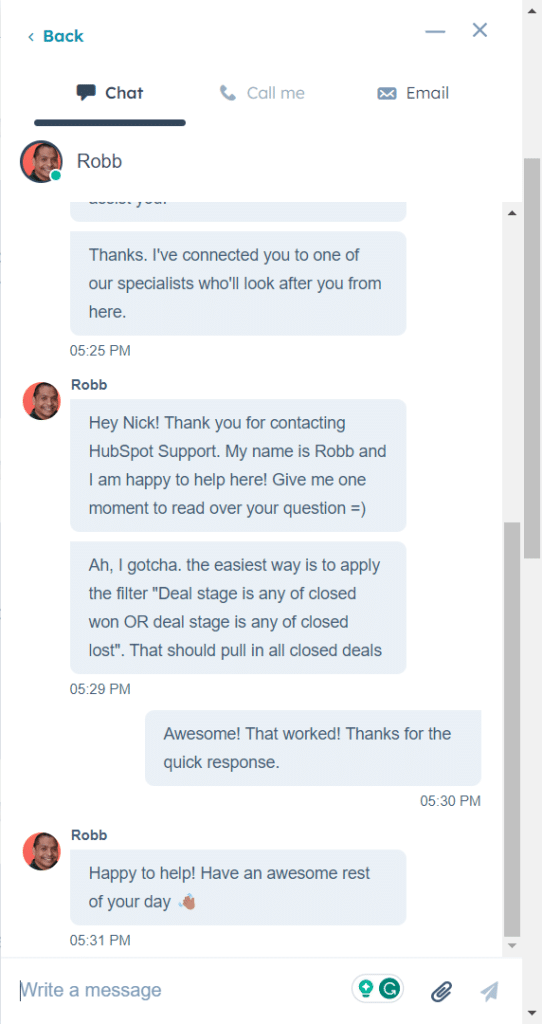
HubSpot also offers a suite of other Hubs that covers everything from content management to marketing.
In this regard, HubSpot is essentially an all-in-one platform for streamlining processes, analyzing data, and managing your business.
At Small Business Bonfire, we love the fact that it allows us to easily access customer data from all parts of the platform and that we can have an updated view of our customer’s journey.
HubSpot offers the following additional Hubs:
- HubSpot Marketing Hub
- HubSpot Service Hub
- HubSpot CMS Hub
- HubSpot Operations Hub
Let’s break down each to give you a better idea of what they offer.
HubSpot Marketing Hub
HubSpot’s Marketing Hub has everything your business needs to create and operate successful marketing campaigns.
Here are some features they offer:
- Ad campaign management
- Lead Capture
- Marketing email
- functionality
- Social media integration
- Landing page tool
Here’s an example of the ad creation screen with some offers they provide new users.
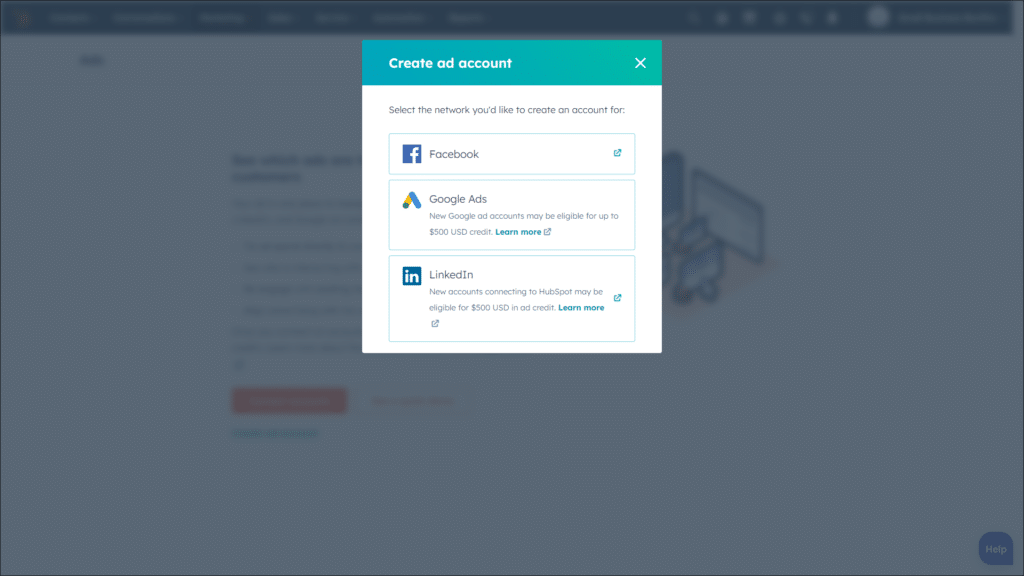
HubSpot Service Hub
HubSpot’s Service Hub helps businesses connect with customers and provide exceptional service all in one place.
They offer the following features:
- Ticketing system
- Customer Portals
- Feedback Surveys
- Live Chat functionality (with knowledge base)
We especially liked the fact that the Live Chat feature utilizes HubSpots impressive knowledge base (with the Professional plan) to assist customers immediately.
Our HubSpot Service Hub review goes more in-depth about everything it provides.
HubSpot CMS Hub
HubSpot’s CMS Hub is a content management system that helps you create and manage content for your business.
Here are some features that CMS Hub offers:
- A/B Testing for email/websites
- Mobile optimization
- Website themes
- Custom domain connection
- Blog expert
For this section, we decided to show how easy and simple it was to set up a blog page. Here’s our test blog.
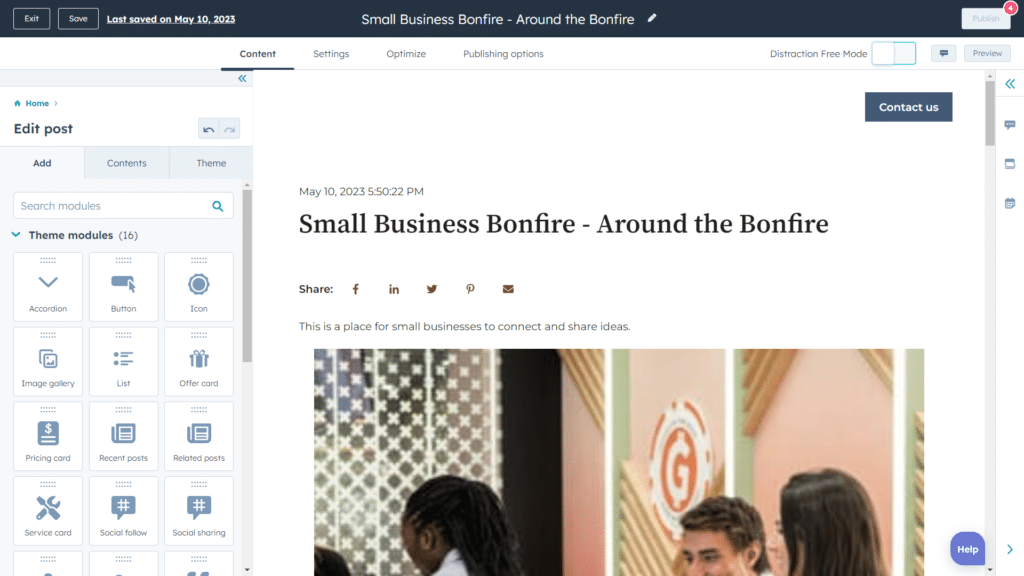
Check out our HubSpot CMS Hub review for more information.
HubSpot Operations Hub
This powerhouse Hub allows you to automate manual processes, manage data quality, and connect all your business apps in one place.
Some of its features include:
- Data sync
- Data quality automation
- Integrations with tons of apps
Here’s an example where we connected Canva to our HubSpot account using their integration feature.
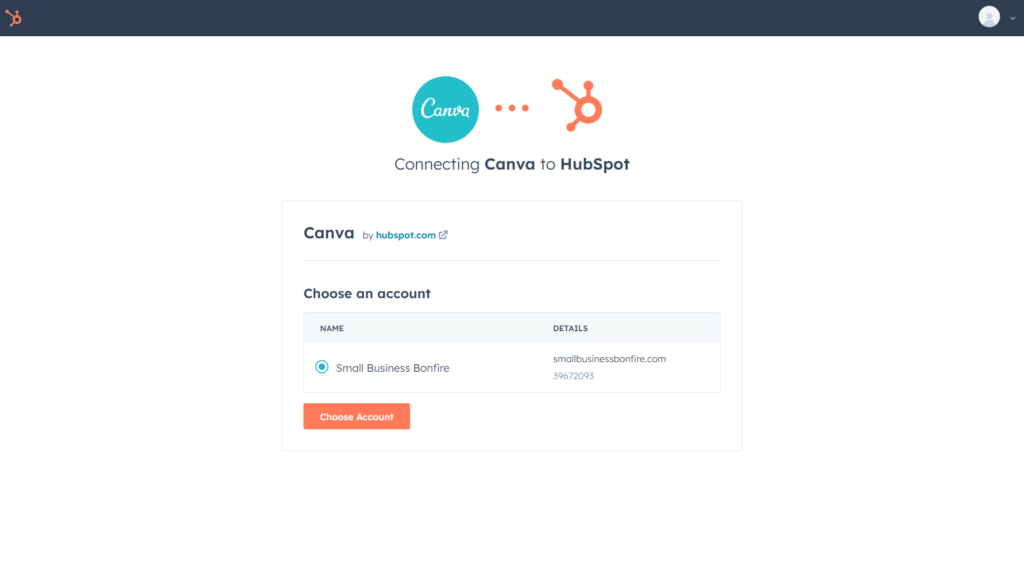
Their data sync feature is also especially impressive, allowing teams to collaborate and work together while their progress updates in real-time.
HubSpot Sales Hub Alternative Comparison
HubSpot’s Sales Hub has a lot of great features, but it’s not for everyone. Here are some examples of alternative sales software to check out.
Is HubSpot Sales Hub Worth it for Small Business Owners?
Overall, Sales Hub is worth checking out if you’re a small business owner.
The fact that they provide free trials with their most comprehensive plans means you can try them out without any buyer’s remorse.
At the end of the day, there are more affordable sales platforms out there, but having everything in one place with HubSpot is pretty hard to beat.
Frequently Asked Questions About HubSpot Sales Hub
Some of the advantages of HubSpot Sales Hub include its automated email campaigns, sales engagement tools, contact management, and reporting dashboard capabilities.
Sales Hub is a CRM software designed to help small businesses manage their sales pipeline and process more efficiently. It offers features like deal tracking, contact management, automated email campaigns, and reporting dashboards.
Yes! With its automated email campaigns, contact management, and reporting dashboard capabilities, HubSpot Sales Hub can be a great asset for small businesses looking to streamline their sales process.
It offers features like deal tracking, contact management, automated email campaigns and reporting dashboards that make it worth the investment. Plus, there are plenty of ways you can save on your subscription.
Both Salesforce and HubSpot offer powerful CRM solutions, but the two platforms are designed for different types of customers.
Salesforce is best suited for larger enterprises with complex sales processes, while HubSpot is ideal for small businesses looking to streamline their operations. Ultimately, it depends on your business’s needs.
The main difference between Marketing Hub and Sales Hub is their focus.
The Marketing Hub covers the end-to-end marketing process, from creating campaigns to analyzing customer data, while the Sales Hub focuses on managing contacts, tracking deals, and automating personalized email campaigns.
Both tools are important for growing a successful business but have different purposes.
Newsletter Signup
Join The Leads Field Guide Newsletter for tips, strategies and (free) resources for growing your leads, and closing more deals.

